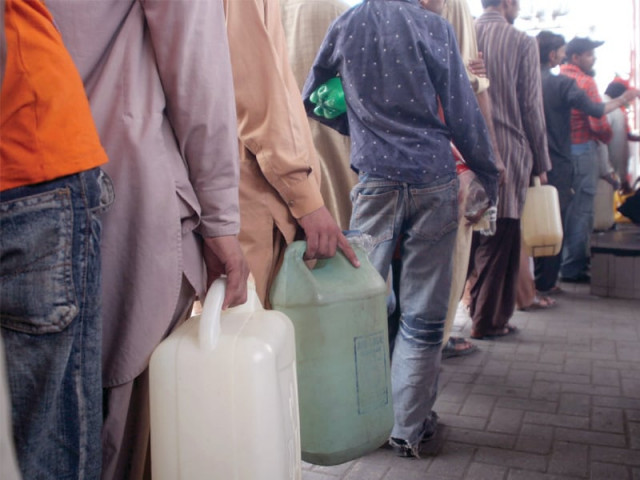Strike called off: Oil tankers resume supply to petrol stations
Oil tankers’ owners reduced demand of 60 per cent increase to 40 per cent.

The oil tanker owners association and contractors association have called off their strike on Thursday but people still face difficulties in getting petrol in some parts of Karachi.
The associations had earlier announced a strike, stopping oil supply to petrol pumps in Karachi last night.
Sindh Governor Dr Ishratul Ibad took notice of the situation after the strike created transport problems for people.
Both the oil tankers and the contractors associations called off their strike after negotiations with the Sindh governor who assured them their problems would be addressed.
Later a notification was issued which allows oil tankers to increase the transportation fare by 45 per cent.
The oil tankers have resumed oil supply but people are still facing problems regarding the availability of oil in some parts of Karachi.
(Updated from print edition below)
Strike over rates: As tankers cut supply, the city runs on empty
As late night negotiations continued, there was hope that the crippling strike against freight fares would be called off - but the deadlock lingers on.
After 90 per cent of all stations in the city dried up, oil tankers owners held a meeting with Pakistan State Oil (PSO) and the Oil Companies Advisory Committee (OCAC). After the negotiations, the oil tankers’ owners lessened their earlier demand of a 60 per cent increase in the total fares of oil tankers. They now agreed on a 45 per cent increase.
However, they insisted that the strike will continue on Thursday until an official notification is issued from the Oil and Gas Regulatory Authority (Ogra). OCAC has faxed the modified demands to Ogra.
It was a difficult day on Wednesday as Karachi ran dry. The police were being deployed as maddened people started beating up petrol station staff. The oil tanker strike was made effective by the fact that oil supply companies have kept their private fleet off the roads. “Whenever a similar situation arose in the past, these companies would supply the stations with their own tankers, but this is not the case this time,” said a representative of the Pakistan Petroleum Dealers Association and the CNG Dealers Association, Abdul Sami Khan. He assured that people would have access to CNG.
The strike was for Karachi, Sukkur and Hyderabad on Wednesday, but will go nationwide on Thursday, said the All Pakistan Oil Tanker Owners’ Association’s Haji Mohammad Anwar Mehsood.
Residents of the three cities struggled to get fuel for their cars and motorcycles. The massive traffic jams and rush at petrol stations worsened the tempers. By evening, most stations decided to close down as the contractors responded to the strike and kept their fleet off the roads.
According to a spokesperson for Pakistan State Oil (PSO), the strike did indeed affect the three Sindh cities. Nevertheless, it may be possible to supply fuel through other oil tankers, she had said. For their part, the All Pakistan Oil Tanker Owners’ Association representatives insisted that they are being forced to strike. Its general secretary Haji Muhammad Hanif Kakar told The Express Tribune, “We did not want burden residents but PSO has forced us to take this step.” The association has been protesting for its rights since April 22 — when members suspended supplies to private companies, such as Gul Ahmed, Tapal, etc. — but they were never taken seriously, he complained.
Referring to their demands, Kakar said, “We sent our 15-point agenda to PSO on April 22,” he said. An increase in fares in proportion to the increase in diesel rates, equal fares for Kandahar and Quetta due to the high risk, a 100 per cent increase in fares for supplying furnace oil to local grid stations and other demands were listed on this agenda.
On April 30, PSO replied and told them that these concerns should be sent to Ogra. The oil tankers association asked PSO officers to meet them on May 2, but they refused.
The rates of petroleum products are set by Ogra and not oil marketing companies, the PSO spokesperson said. “The final decision will be made by Ogra.” Mehsood tried to explain their plight. There are 25,000 oil tankers in the country but no one is earning any profit ever since the rates of diesel and other petroleum products went up, he said. “A pair of tyres that cost Rs20,000 is now worth Rs80,000 and diesel prices have doubled in the past couple of months.”
Published in The Express Tribune, May 5th, 2011.



















COMMENTS
Comments are moderated and generally will be posted if they are on-topic and not abusive.
For more information, please see our Comments FAQ